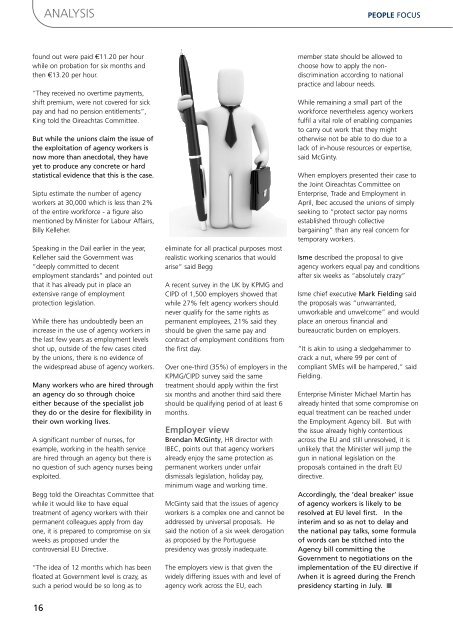PEOPLE FOCUS - CIPD
PEOPLE FOCUS - CIPD
PEOPLE FOCUS - CIPD
- TAGS
- people
- focus
- cipd
- www.cipd.co.uk
Create successful ePaper yourself
Turn your PDF publications into a flip-book with our unique Google optimized e-Paper software.
ANALYSIS <strong>PEOPLE</strong> <strong>FOCUS</strong><br />
found out were paid €11.20 per hour<br />
while on probation for six months and<br />
then €13.20 per hour.<br />
“They received no overtime payments,<br />
shift premium, were not covered for sick<br />
pay and had no pension entitlements”,<br />
King told the Oireachtas Committee.<br />
But while the unions claim the issue of<br />
the exploitation of agency workers is<br />
now more than anecdotal, they have<br />
yet to produce any concrete or hard<br />
statistical evidence that this is the case.<br />
Siptu estimate the number of agency<br />
workers at 30,000 which is less than 2%<br />
of the entire workforce - a figure also<br />
mentioned by Minister for Labour Affairs,<br />
Billy Kelleher.<br />
Speaking in the Dail earlier in the year,<br />
Kelleher said the Government was<br />
“deeply committed to decent<br />
employment standards” and pointed out<br />
that it has already put in place an<br />
extensive range of employment<br />
protection legislation.<br />
While there has undoubtedly been an<br />
increase in the use of agency workers in<br />
the last few years as employment levels<br />
shot up, outside of the few cases cited<br />
by the unions, there is no evidence of<br />
the widespread abuse of agency workers.<br />
Many workers who are hired through<br />
an agency do so through choice<br />
either because of the specialist job<br />
they do or the desire for flexibility in<br />
their own working lives.<br />
A significant number of nurses, for<br />
example, working in the health service<br />
are hired through an agency but there is<br />
no question of such agency nurses being<br />
exploited.<br />
Begg told the Oireachtas Committee that<br />
while it would like to have equal<br />
treatment of agency workers with their<br />
permanent colleagues apply from day<br />
one, it is prepared to compromise on six<br />
weeks as proposed under the<br />
controversial EU Directive.<br />
“The idea of 12 months which has been<br />
floated at Government level is crazy, as<br />
such a period would be so long as to<br />
16<br />
eliminate for all practical purposes most<br />
realistic working scenarios that would<br />
arise” said Begg<br />
A recent survey in the UK by KPMG and<br />
<strong>CIPD</strong> of 1,500 employers showed that<br />
while 27% felt agency workers should<br />
never qualify for the same rights as<br />
permanent employees, 21% said they<br />
should be given the same pay and<br />
contract of employment conditions from<br />
the first day.<br />
Over one-third (35%) of employers in the<br />
KPMG/<strong>CIPD</strong> survey said the same<br />
treatment should apply within the first<br />
six months and another third said there<br />
should be qualifying period of at least 6<br />
months.<br />
Employer view<br />
Brendan McGinty, HR director with<br />
IBEC, points out that agency workers<br />
already enjoy the same protection as<br />
permanent workers under unfair<br />
dismissals legislation, holiday pay,<br />
minimum wage and working time.<br />
McGinty said that the issues of agency<br />
workers is a complex one and cannot be<br />
addressed by universal proposals. He<br />
said the notion of a six week derogation<br />
as proposed by the Portuguese<br />
presidency was grossly inadequate.<br />
The employers view is that given the<br />
widely differing issues with and level of<br />
agency work across the EU, each<br />
member state should be allowed to<br />
choose how to apply the nondiscrimination<br />
according to national<br />
practice and labour needs.<br />
While remaining a small part of the<br />
workforce nevertheless agency workers<br />
fulfil a vital role of enabling companies<br />
to carry out work that they might<br />
otherwise not be able to do due to a<br />
lack of in-house resources or expertise,<br />
said McGinty.<br />
When employers presented their case to<br />
the Joint Oireachtas Committee on<br />
Enterprise, Trade and Employment in<br />
April, Ibec accused the unions of simply<br />
seeking to “protect sector pay norms<br />
established through collective<br />
bargaining” than any real concern for<br />
temporary workers.<br />
Isme described the proposal to give<br />
agency workers equal pay and conditions<br />
after six weeks as “absolutely crazy”<br />
Isme chief executive Mark Fielding said<br />
the proposals was “unwarranted,<br />
unworkable and unwelcome” and would<br />
place an onerous financial and<br />
bureaucratic burden on employers.<br />
“It is akin to using a sledgehammer to<br />
crack a nut, where 99 per cent of<br />
compliant SMEs will be hampered,” said<br />
Fielding.<br />
Enterprise Minister Michael Martin has<br />
already hinted that some compromise on<br />
equal treatment can be reached under<br />
the Employment Agency bill. But with<br />
the issue already highly contentious<br />
across the EU and still unresolved, it is<br />
unlikely that the Minister will jump the<br />
gun in national legislation on the<br />
proposals contained in the draft EU<br />
directive.<br />
Accordingly, the ‘deal breaker’ issue<br />
of agency workers is likely to be<br />
resolved at EU level first. In the<br />
interim and so as not to delay and<br />
the national pay talks, some formula<br />
of words can be stitched into the<br />
Agency bill committing the<br />
Government to negotiations on the<br />
implementation of the EU directive if<br />
/when it is agreed during the French<br />
presidency starting in July. ■

















